General
Mak Honours Prof. Capt. Dr. Virginio Lachora Ongom
Published
8 years agoon
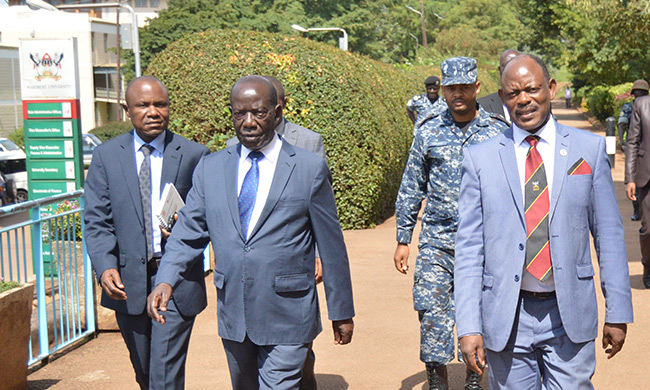
On Thursday, 28th June 2018, Makerere University paid well-deserved tribute to one of the most hardworking researchers and publishers in his day and first African Dean of the School of Public Health (MakSPH), Prof. Capt. Dr. Virginio Lachora Ongom. Appropriately described as the “Meteorite from Pakwach” by the day’s emcee, Mr. George Piwang Jalobo, Prof. Ongom’s light brilliantly flashed across the sky of Pakwach District to the rest of Uganda, then to Kenya onto India and then vanished after only forty seven years, leaving behind a trail of achievements and publications.
The writing on the wall became clearer as speaker after speaker paid tribute at the Inaugural Memorial Lecture. Prof. Ongom was a hardworking academic and army officer who was passionate about using his time and resources to cause a change in his community. As a father, he was a strict disciplinarian and time keeper whose home often turned into an impromptu ‘reception centre’ for patients he often ferried over hundreds of kilometres from his Panyagoro village to Mulago Hospital.
“Prof. Ongom intervened and treated those who had been ‘bewitched’ and they recovered. That is how those ‘witches’ survived being lynched by their community, thanks to his research” said the College of Health Sciences (CHS)’ Deputy Principal-Dr. Isaac Okullo in his welcome remarks.
Representing the CHS Principal-Prof. Charles Ibingira, Dr. Okullo paid tribute to Prof. Ongom’s perseverance and determination in the face of resource constraints, to arrest the spread of bilharzia and treat affected persons. “This is what we always want as the result of our research.”
Dr. Okullo congratulated MakSPH upon continuing to raise awareness about bilharzia and other Neglected Tropical Diseases (NTDs) and thanked partners such as MaxMind Corporation, the Bill and Melinda Gates Foundation (BMGF) as well as stakeholders such as the Ministry of Health (MoH)’s Vector Control Division (VCD) and the Uganda Bureau of Statistics (UBOS) for supporting bilharzia research. “The event is a first step to galvanise support to eliminate bilharzia and other NTDs and so we still need your continued support to take this cause forward” he added.
Describing the late Prof. Capt. Dr. VL Ongom as a true patriot, the Vice Chancellor Prof. Barnabas Nawangwe in his remarks said, “The major purpose of this function therefore is to honour the patriotism, commitment and hard work of all researchers including Prof. Ongom, whose selfless effort and dedication brought these findings to light.”
Prof. Nawangwe further stressed that as the leading research university in Africa, Makerere would provide leadership in the endeavour to raise funds for training and research, in order to contribute to elimination of Bilharzia in Uganda. He shared Makerere’s pride at being research leaders in areas such as HIV/AIDS, Ebola, Malaria, as well as other diseases that hamper socio-economic development in Africa.
“We thank the Government for the support it continues to give this institution and pledge that every single coin will be put to the good cause of eliminating bilharzia and other Neglected Tropical Diseases” he concluded.
Introducing the Inaugural Memorial Lecture, the MakSPH Dean, Dr. Rhoda Wanyenze shared that the event was a continuation of an initiative embarked on by the School in December 2017; to honour all its erstwhile Heads. Four of these namely; Prof. Josephine Nambooze, Prof. John Kakitahi, Prof. Fred Wabwire-Mangen and Prof. David Serwadda were present to celebrate Prof. VL Ongom’s rich legacy, appropriately described by Dr. Wanyenze as “a trail of evidence through his scientific publications for posterity.”
The Dean further shared the School’s proposal to establish the Prof VL Ongom Endowed Chair and Endowment Fund, to support capacity building, research and innovations towards eliminating bilharzia and NTDs, including nodding disease. “This Endowed Chair presents a great opportunity to enhance the capacity of the University, Ministry of Health and UPDF Medical Services, to ably contribute solutions to this big challenge.
“Our target is to raise at least US$2million by June 2019, when we hold the next Prof. Ongom Memorial Lecture and at least US$15million by June 2024, a landmark year, when we celebrate 50 years since the Institute of Public Health was established, and the 6th annual Prof VL Ongom Memorial Lecture. Ladies and gentlemen, this is not just about money, but the real impact that we can and should make on the affected communities” remarked Dr. Wanyenze.
The choice of the person to deliver the Inaugural Prof. V.L. Ongom Memorial lecture couldn’t have been more appropriate. Prof. Birgitte Vennervald is no stranger to Uganda’s fight against bilharzia. Having first come to Uganda in 1989 under the auspices of the Danish International Development Agency (DANIDA), Prof. Vennervald has gone on to traverse more Districts and villages in Uganda than the average national, thanks to the inspiration awakened by Prof. Ongom’s research and publications on the same.
“Prior to Prof. Ongom’s publications, most of the research on schistosomiasis was conducted outside sub-Saharan Africa, especially in Egypt, South America and Asia” shared Prof. Vennervald. “In this presentation we quote two of his papers on The Epidemiology and consequences of Schistosoma Mansoni” she continued.
Taking note of the aforementioned papers published in 1972, Prof. Vennervald stressed that these had to be revisited and further examined because Prof. Ongom had the benefit of understanding the local dialect and culture in his native Panyagoro community. “He had to rely on his hands to do all the necessary tests and his research demonstrated that in a community where bilharzia exists, it may end up being the most important public health need. We therefore should follow in Prof. Ongom’s footsteps for he indeed demonstrated that research must be evidence-based” she enthused.
Prof. Vennervald went on to congratulate MakSPH, the Ministry of Health (MoH) as well as other partners upon their continued research and vector control programmes that have led to the elimination of the previously endemic river blindness in from 18 out of the original 39 Districts of Uganda. “I nevertheless call upon the School of Public Health to make bilharzia and NTDs an attractive topic to students and researchers so as to keep the subject vibrant. Additionally, general drug distributors should be trained on how to handle or refer cases of bilharzia and other NTDs.”
She nevertheless called for a multi-sectoral approach in the fight against bilharzia and NTDs by involving agencies such as; MoH, Ministry of Education and Sports (MoES), Ministry of Water and Environment (MWE) as well as the Ministry of Tourism, Wildlife and Antiquities, in order to safeguard tourists from being infected by diseases especially waterborne ones such as bilharzia.
Prof. Vennervald however took note of poor medicine uptake due to fear of side effects, the lack of child-friendly treatment and poor sanitation especially among migratory fishing communities as problems that still threatened the fight against bilharzia. “Some areas such as the islands of Lake Victora and districts in the Albertine region such as Hoima, Buliisa and Pakwach have experienced bilharzia upsurge.
“Despite all this, we learn from Prof. Ongom that we should remain focused on bilharzia by insisting that this is our problem, our community’s problem and Uganda’s problem in order to bring it to an end. You have the knowledge, research base and dedicated people in Makerere and Ministry of Health. You should be able to find a lasting solution to this problem and meet Government’s Vision 2040 goal” she concluded.
“We have done a lot of research and made a lot of interventions but we must admit that the bilharzia problem is much bigger than we thought” remarked Dr. Narsis Kabatereine, the discussant of the Inaugural Memorial Lecture. As one who joined the MoH’s Vector Control Division (VCD) in 1980, Dr. Kabatereine paid tribute to Prof. Ongom, who despite living for a short time wrote very prolific papers that demystified previous notions that only Caucasians were susceptible to schistosomiasis.
“I therefore thank Dr. Rhoda Wanyenze and Dr. Christopher Orach for encouraging research on schistosomiasis. This goes to show that research in implementable activities is still much-needed in today’s public health interventions” added Dr. Kabatereine.
The day’s tributes would have been incomplete without voices from those who knew Prof. V.L Ongom way before he became the trailblazing researcher and publisher. Speaking as a trio; Former Prime Minister-Rt. Hon. Kintu Musoke, Second Deputy Prime Minister & Minister of East African Affairs-Hon. Kirunda Kivejinja and Former Minister and Ambassador-Prof. Semakula Kiwanuka oscillated the audience between spellbinding silence and bouts of laughter.
“In 1958 I attended an interview to secure a scholarship to India, where the other interviewee was a young man called V.L Ongom” reminisced Rt. Hon. Kintu Musoke. “While I went on to secure a scholarship from the Government of India, V.L. Ongom received the Madhvani scholarship. Later when we met in India, it was ‘love at first sight’! The Ongom we knew was a serious student, a serious religious man and a serious political operator” he added.
“Hearing my senior colleague describe VL Ongom as a political animal was the biggest surprise to me” began Prof. Semakula Kiwanuka in reference to Rt. Hon. Kintu Musoke’s remarks. “Ongom and I met at Namilyango College in 1953 and what I remember is that he was extremely serious, hardworking and very clever.
“I was the President of the Uganda Students Association at the University of Nairobi but I never knew Ongom to be political! I don’t know what happened to those who went to India” remarked Prof. Semakula Kiwanuka, sending the audience roaring with laughter. “Today is therefore a wonderful day and we thank Makerere for honouring the distinguished scholar that Ongom was. Your presence here especially that of His Excellency the Vice President is testimony to that and I thank you for honouring my classmate, my schoolmate and my universitymate” he concluded.
“Your honouring Ongom and indeed honouring us today has fulfilled in our lives that when you do something good for your country, you will one day be recognised” eulogized Hon. Kirunda Kivenjinja. “As leaders, we hold positions of power and can get things done, but we didn’t want to remind the President to honour Ongom” he continued.
“As freedom fighters, there are three things we don’t do; we don’t seek our own glory, we don’t mourn our dead and we don’t lobby. We therefore thank the organisers of this Memorial lecture for befittingly honouring Prof. Ongom and his family today” summarised Hon. Kivejinja.
In his remarks, the Vice President H.E. Edward Kiwanuka Ssekandi who represented the President H.E. Yoweri Kaguta Museveni saluted the University for honouring distinguished leaders, noting that in so doing, “Makerere University, as a whole, and the College of Health Sciences and School of Public Health, in particular; have embarked on becoming transformation agents!
“This is a wonderful example of Academia getting out of its traditional “ivory tower” mentality into the real world to solve real problems that affect real people! This is re-orientation from ideological dis-orientation which has been a real obstacle to Uganda’s transformation since colonial times!” he added.
The Vice President observed that Prof. VL Ongom had the energy of an Army Captain Doctor even in Academia and seamlessly blended into the Army and Government in service of his community and Nation. “He was also a very religious man, who put his Catholic Christian faith in practice. For he was Chairman of St Augustine’s Chapel Community, and was a true patriot who drove the Chaplain, Rev. Fr. David Kiyingi, to the Uganda-Kenya border and to safety in the 1970s! This occurred when Idi Amin’s soldiers wanted Rev. Fr. Kiyingi dead or alive” he further praised.
H.E. Kiwanuka Ssekandi further noted the importance of a skilled and healthy population in enabling Uganda to realize her Vision 2040 and pledged the Government’s as well as UPDF Medical Services’ readiness to join MoH at the frontline of the struggle to eliminate Bilharzia and other NTDs by 2040.
“These historic projects have been eloquently articulated by the Dean, Dr. Rhoda Wanyenze. I will arrange to meet with the leadership of the University and School of Public Health in the nearest future to discuss these proposals in detail” concluded the President’s speech.
“If there was anyone who learnt anything from his strict timekeeping it was me” shared Ms. Elizabeth Ongom as she paid tribute. “You knew him as Professor but we knew him as Daddy. All we wanted was a father but we understood his commitment, he had to treat people” she added.
“As a family, we are extremely grateful and dearly thank Makerere University for honouring our late father Prof. Virginio Lachora Ongom. As you have heard from Prof. Vennervald’s lecture, Prof. Ongom’s research had impact and some of the bilharzia survivors he treated are today happily married. We also pay tribute to the gift of friends that our late father left behind who have been an integral part of our lives” shared the eldest son Mr. Godfrey Ongom.
There was a hushed silence from the audience as Mama Cecilia Ongom took her turn to pay tribute to her dearly departed husband. Speaking gently and yet authoritatively, Mama Ongom thanked Makerere University and all the organisers for the wonderful tribute to Prof. Ongom. She also thanked the Vice President for representing His Excellency the President at the Inaugural lecture, as well as all in the audience who had spared time to attend the event. “We were both in the same medical profession and we knew the call. We had to care” she summed up.
Prof. Capt. Dr. VL Ongom made a great contribution to science through his research in parasitology, especially in bilharzia and sexually transmitted infections. He published profusely; with over twenty five peer-reviewed publications as the first author, and overall, had over 35 publications including four theses. He was a Board member of the Uganda Commercial Bank; now Stanbic Bank, and oversaw the establishment of the bank’s branch in Pakwach district. In recognition and honour of his outstanding contributions, the Pakwach District Council on Saturday, 30th June 2018 renamed its Health Centre IV the Prof. VL Ongom Memorial Hospital.
Article by Public Relations Office
You may like
General
Makerere Explores Strategic Industry Partnership with Psalms Food Industries to Strengthen Manufacturing Innovation
Published
11 minutes agoon
March 4, 2026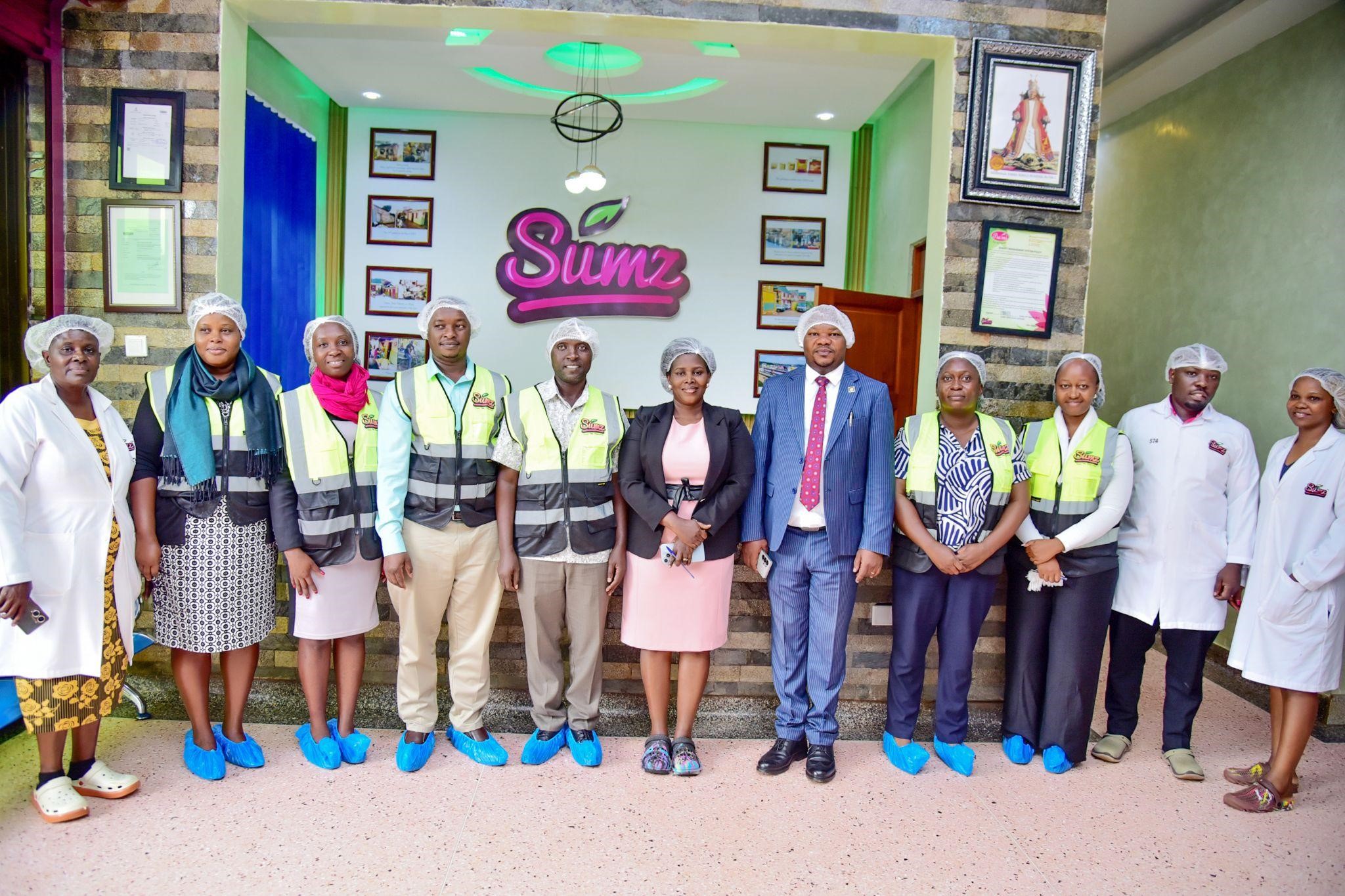
On 2nd March, 2026, representatives from the Advancement Office, the College of Business and Management Sciences and the University Innovation Pod visited Psalms Food Industries to discuss a prospective partnership aimed at strengthening university–industry collaboration in manufacturing, research, innovation, and skills development.
Psalms Food Industries, a homegrown snacks innovation and manufacturing company, operates three major brands, namely, Sumz, Afrikan Harvest and Krunchables, which have grown to a range of 37 products and target the introduction of five new products annually. The company distributes products across Kenya, Rwanda, the Democratic Republic of Congo, South Sudan, and, recently, Tanzania. As a labour of love, the idea of producing snacks was born during the honeymoon of Mr and Mrs Ngabirano, who now run Psalms Food Industries side by side.
Dr. Denis Ngabirano, CEO and Co-Founder of Psalms Food Industries, during the meeting, described the company as “a snacks innovation house, with all our products developed in-house.” He noted.
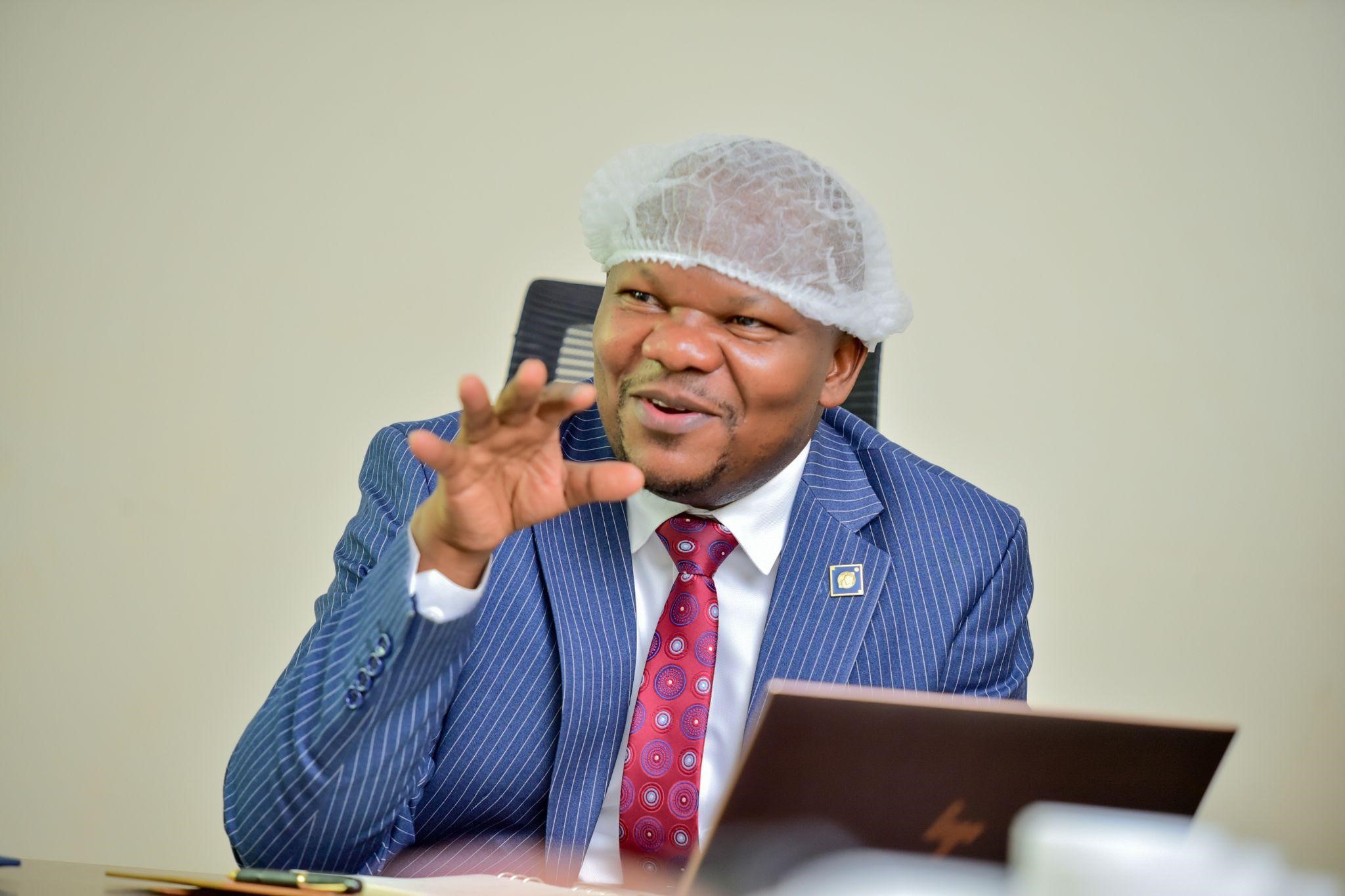
He emphasised the company’s commitment to quality assurance and consumer-centred research, noting that Psalms conducts surveys and gathers customer feedback to inform product development, supported by an internal microbiology and chemistry laboratory.
Dr. Denis Ngabirano noted that the company had only recently introduced two brands, “Afrikan Harvest for it’s health conscious clientele and Kruchables for it’s volume centric clientele.
“Afrikan Harvest has no additives, it is a brand for health-focused consumers,” he explained, while highlighting the differentiated positioning of their product lines. “Sumz is our premium brand, and Krunchables focuses on volume.”
Student-Centered Experiential Learning
A key focus of the meeting was structured experiential learning for students across disciplines. Potential areas of collaboration include internships, graduate trainee pathways, and hands-on exposure within Psalms’ incubation and production facilities.
The proposed engagement spans multiple fields, including environmental sciences, engineering, procurement and logistics, finance and accounting, quality control, production and manufacturing, human resource management, marketing, and international business.
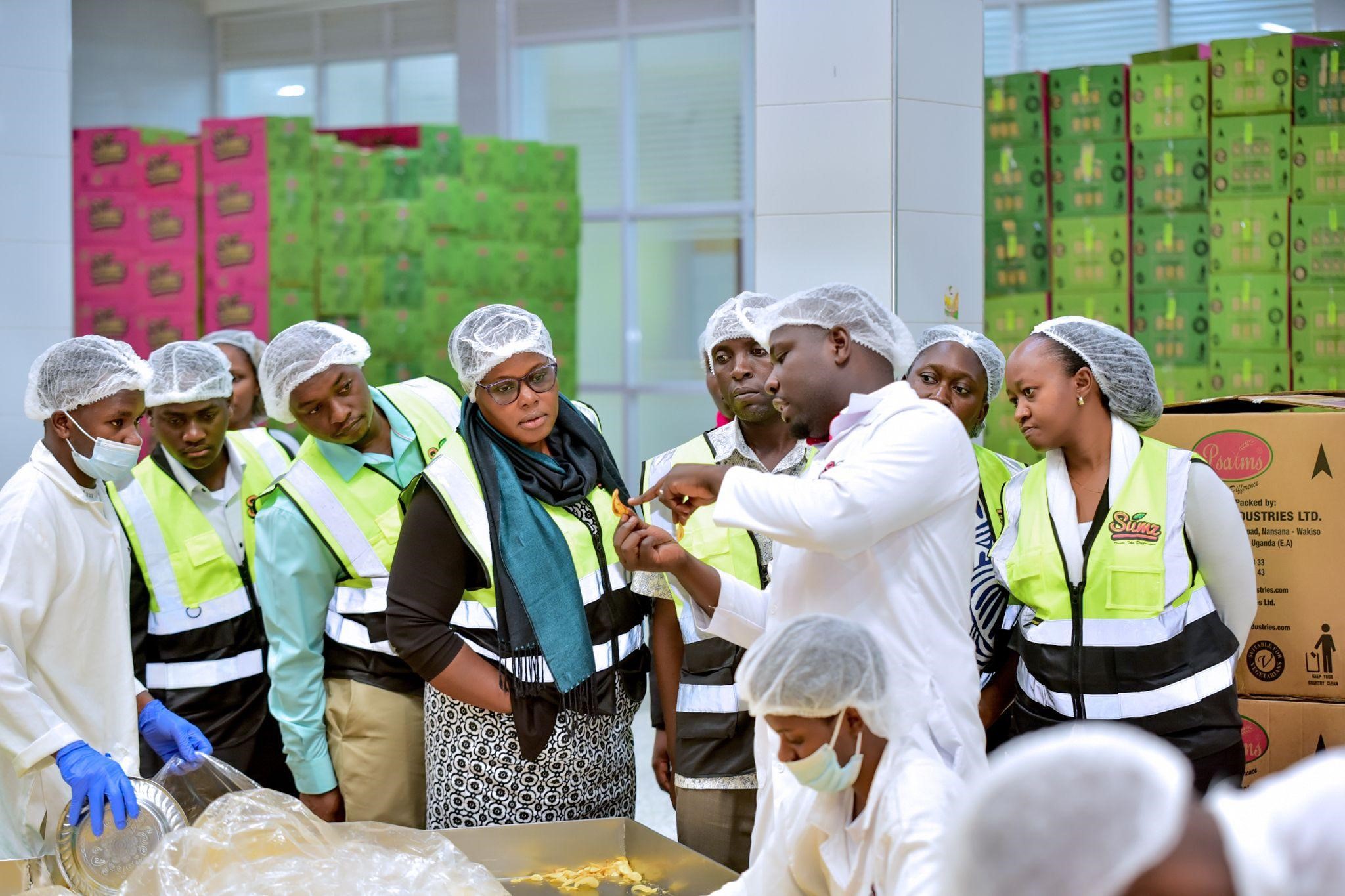
The partnership could provide students with direct exposure to real-time production systems, standard operating procedures (SOPs), and quality assurance frameworks, strengthening the practical relevance of their academic training.
Among the innovative ideas discussed was a potential competition involving students from the Fine Art and Industrial Design disciplines to redesign packaging for selected Sumz products. The proposal would allow top designs to be commercially adopted, creating a direct bridge between creativity, intellectual property development, and industrial application.
Research, Innovation and Commercialisation
Both institutions expressed interest in joint applied research initiatives, particularly in process optimisation, data analytics for manufacturing efficiency, product improvement, and sustainable production systems.
Opportunities were also discussed around collaborative research in machine design, crop development for snack processing, and factory energy solutions, areas that not only benefit Psalms but have broader implications for Uganda’s manufacturing sector.
The engagement further highlighted potential linkages with the University’s innovation and commercialisation structures, including the University Innovation Pod (UNIPOD), to support co-creation and scaling of student-led innovations.
Mr Awel Uwihanganye, Chief Advancement Officer at Makerere University, proposed strengthening the engagement through structured programming, including a planned collaboration between the University’s innovation Hub and the upcoming incubation Hub at Psalms Food Industries, particularly to support the commercialisation of research outcomes for both students and staff.
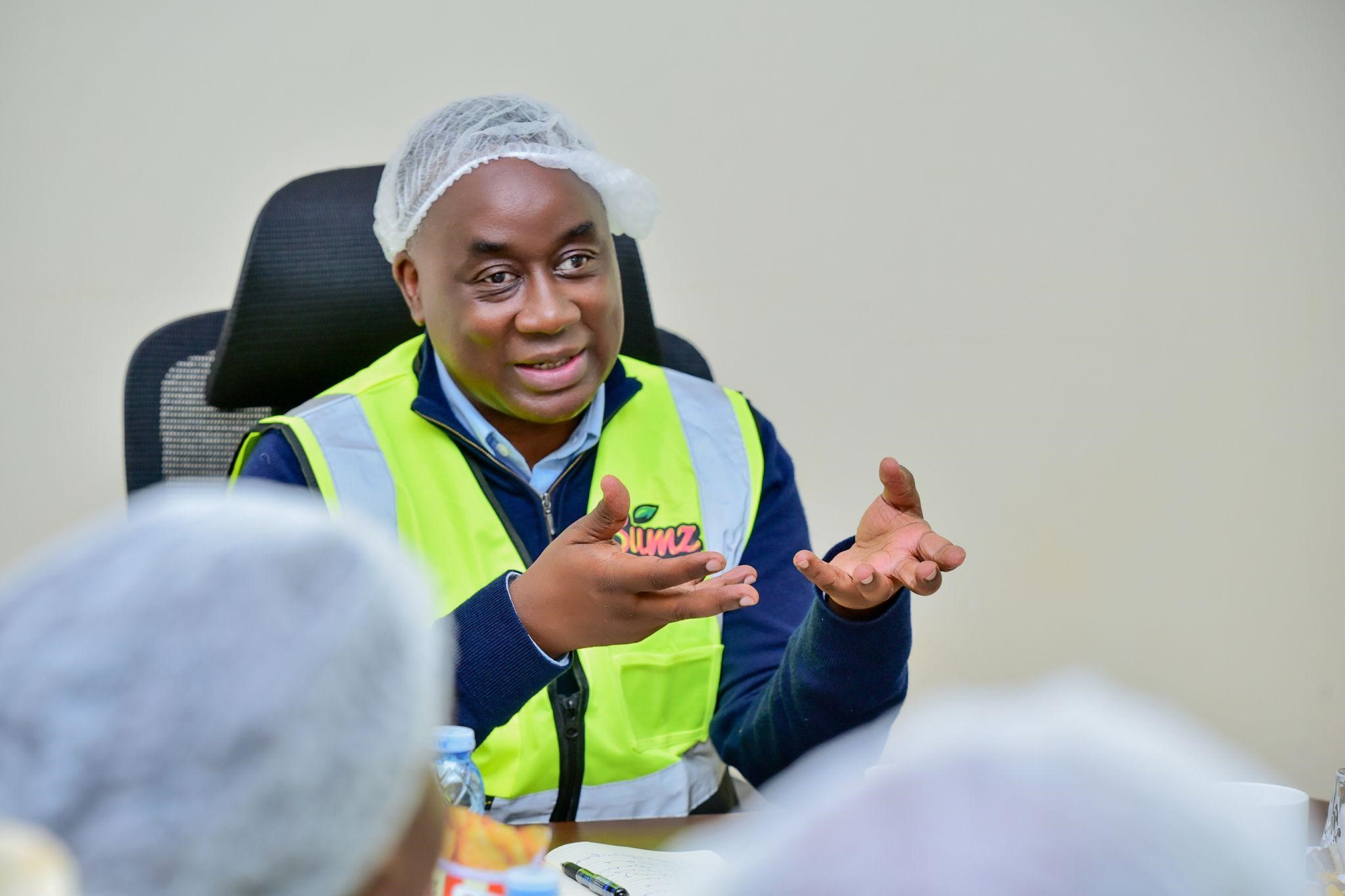
Curriculum Co-Creation and Staff Exchange
Beyond student placements, discussions also focused on co-developing academic content that responds more directly to industry needs, particularly within the manufacturing value chain.
Proposals included guest lectures by industry practitioners, staff exchange programmes to expose academic staff to factory operations, and tailored short courses for Psalms staff based on identified skills gaps.
Dr. Jude Mugarura, Head of the Department of Marketing and Management at COBAMS, emphasised the importance of embedding the partnership within academic programming. He proposed “internships for students in HR, marketing, international business, accounting and finance,” as well as staff exchanges to give University staff hands-on exposure to manufacturing operations.
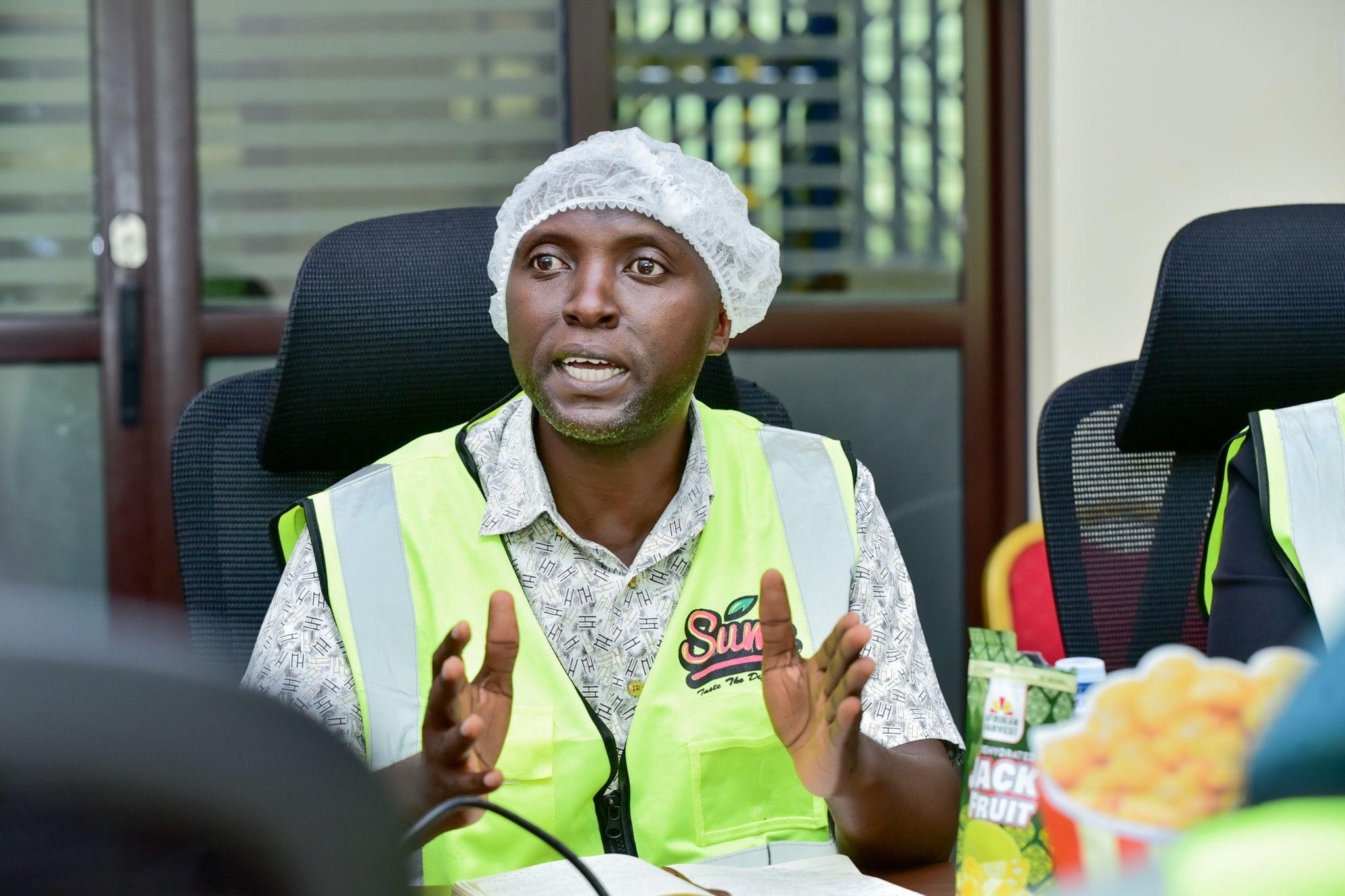
He further suggested specialised courses tailored to the factory’s needs and attachment of research students interested in manufacturing. Such collaboration would contribute to curriculum responsiveness and ensure that graduates are equipped with market-relevant competencies.
Strengthening University–Industry Linkages
The engagement reflects Makerere University’s continued commitment to strengthening partnerships that bridge knowledge generation and real-sector application.
Both institutions expressed a shared vision of building a structured, mutually beneficial collaboration that integrates research, innovation, skills development, and enterprise growth, positioning the University as a key knowledge partner in Uganda’s manufacturing transformation.
Discussions remain ongoing as both parties refine priority areas for formalisation.
Caroline Kainomugisha is the Communications Officer, Advancement Office.
General
Makerere University commemorates 13 transformative years of partnership with Mastercard Foundation
Published
2 days agoon
March 2, 2026
On Friday, 27th February 2026, Makerere University proudly celebrated 13 years of a significant partnership with the Mastercard Foundation, a prestigious independent organisation headquartered in Toronto, Canada. Since its inception in 2013 with the launch of the Scholars Program-currently headed by Prof. Justine Namaalwa, this collaboration has grown significantly, expanding to include two additional initiatives: The E-learning Initiative-headed by Prof. Paul Muyinda Birevu and the Africa Climate Collaborative-headed by Prof. Gorretie Nabanoga. This long-term partnership underscores the shared commitment to fostering education, innovation, and sustainability in Uganda and across Africa.
The colourful event coincided with the 76th Graduation Ceremony, during which Makerere University honoured Ms. Reeta Roy, the Founding President and CEO of the Mastercard Foundation, with an honorary Doctor of Laws.

In her commencement speech, Ms. Roy thanked Makerere University for considering a partnership with the Mastercard Foundation and for conferring upon her a prestigious honorary award.
“Mastercard Foundation is honoured to collaborate with this esteemed university, and I appreciate the recognition through this award. I am excited to be associated with Makerere University and look forward to actively embodying its values. Joining the broader community of alumni from this distinguished institution is a privilege, and I am eager to contribute to its legacy,” stated Ms. Roy.

During the reception in honour of Ms. Roy, the Chairperson of Makerere University Council, Dr. Lorna Magara, acknowledged the invaluable support from the Mastercard Foundation. She emphasised the profound impact of the Foundation’s various initiatives, particularly the scholarships for disadvantaged youth, which enable them to access higher education and opportunities that might have otherwise been beyond their reach.
“On behalf of the Makerere University Council and the broader University community, I extend our sincere gratitude to Mastercard Foundation for its commitment to collaborating with Makerere University in various endeavours, especially for providing scholarships to our underprivileged young people who would never have stepped inside a lecture room at the University.” Dr. Magara stated.

Dr. Magara, in a special way, thanked Ms. Roy for her transformative leadership and unwavering commitment to supporting young people in Africa, citing her efforts to ensure young people get their voices heard.
“As a university, our business is with young people. We are therefore committed to providing the environment and education that deliver meaningful pathways. We will provide an environment that ensures young people have a voice and agency to create meaningful change in society.” Dr. Magara pledged.

Dr. Magara further congratulated Ms. Roy on her honorary Doctor of Laws from Makerere University, noting that it is the university’s highest honour for individuals who have excelled in their careers.
“On behalf of the Makerere University community, I would like to extend my heartfelt congratulations on your honorary Doctor of Laws. This esteemed recognition represents the highest honour our institution can bestow on individuals who have demonstrated exceptional achievement and excellence across various facets of their career.” Dr. Magara remarked.
Prof. Justine Namaalwa, the Program Director of the Mastercard Foundation Scholars Program and the Coordinator for all Mastercard Foundation Initiatives at Makerere University, expressed her appreciation for the thirteen-year collaboration between Makerere University and the Mastercard Foundation. She highlighted that the partnership had yielded significant, impactful results.

“In 2013, Makerere University partnered with the Mastercard Foundation to educate the next generation of transformative African leaders who can positively impact their lives, their communities, and the economies of Africa. The partnership has had a significant impact. I thank the University Management and the Foundation team for this visionary collaboration,” remarked Prof. Namaalwa.
Prof. Namaalwa articulated that the partnership with the Mastercard Foundation is primarily focused on empowering young people as agents of change for transformational leadership in Africa. She presented compelling statistics demonstrating the positive impact of the scholars’ program, highlighting the success of individuals who have completed their education and their subsequent professional experiences after university graduation.

“This partnership focuses on young people, aiming to create positive change in their lives. To date, the Scholars Program has graduated 974 alumni, with 48% securing formal employment, 18% starting their own businesses, 8% participating in internships, and 5% pursuing further education. Overall, 72% of Scholar alumni are actively engaged in employment or entrepreneurship,” Prof. Namaalwa stated.
The colourful event showcased a dynamic array of activities that highlighted the entrepreneurial spirit of Scholars and alumni from the Mastercard Foundation at Makerere University. Attendees enjoyed a mini-exhibition featuring innovative products from these ventures.

A video documentary illustrated the positive impact of the three Mastercard Foundation initiatives. The event also featured inspiring poetry recitations by Scholars and a lively atmosphere of music and dance, creating an engaging and memorable experience for all participants.
The high-level event was attended by senior University officials, led by the Chairperson of Council, Dr. Lorna Magara; the Vice-Chancellor, Prof. Barnabas Nawangwe; the Vice-Chancellor, Academic Affairs, Prof. Sarah Ssali, Deputy, and the Ag. Deputy Vice-Chancellor, Finance and Administration Prof. Winston Tumps Ireeta. Mr Yusuf Kiranda, the University Secretary; and Prof. Buyinza Mukadasi, the Academic Registrar, Chancellor Emeritus-Prof. Ezra Suruma, former Chairperson of the Steering Committee of Mastercard Foundation Scholars Program-Prof. Umar Kakumba, and the Deputy Executive Secretary, RUFORUM, and former Program Coordinator of the Scholars Program at Makerere University-Dr. Florence Nakayiwa, among many other officials graced the function.

The event was also graced by a high-level delegation from the Mastercard Foundation, led by Ms. Reeta Roy, the Founding President of the Foundation, and included the Mastercard Foundation Teams from the Country offices in Kigali, Nairobi, and Kampala; the Program partners; the Mentors, Scholars and alumni; as well as the Program staff of the three Mastercard Foundation Initiatives at Makerere University.
At the end of the event, Makerere University honoured Ms. Reeta Roy with University memorabilia, including a pencil-drawn portrait, a pencil-drawn photo of the Ivory Tower, and other Ugandan crafts. Ms. Roy cut a graduation cake together with the 10 graduates of the 76th graduation ceremony from the Mastercard Foundation Scholars Program.
Bernard Buteera is the Principal Public Relations Officer for the Mastercard Foundation Scholars Program at Makerere University.

It is with great pleasure that I welcome you to this edition of Mak News Magazine, a publication that continues to chronicle Makerere University’s journey as a centre of academic excellence, innovation, and societal transformation.
The stories featured in this issue vividly demonstrate Makerere’s unwavering commitment to addressing national, regional, and global challenges through research, partnerships, and people-centred solutions. They reflect a university that is deeply engaged with society, one that applies knowledge not only to advance scholarship, but also to improve lives.
A recurring theme in this edition is innovation for resilience and inclusion. From the College of Agricultural and Environmental Sciences’ Healthy Soy Initiative combating child malnutrition amid climate change, to the cutting-edge work of CEDAT’s Team Green Minds integrating IoT into agriculture, Makerere continues to harness science and technology to respond to pressing development needs. Equally inspiring is the College of Natural Sciences’ success in securing international funding to scale up fish processing technologies, with a deliberate focus on empowering women and strengthening livelihoods.
This issue also highlights Makerere’s growing role in advancing health and wellbeing. The launch of the Early Intervention Psychiatry Services Clinic at Makerere University Hospital marks an important step in strengthening mental health services, while the Hospital’s transformation from a modest sickbay into a centre of excellence stands as a testament to decades of strategic investment, dedication, and service to the nation.
Our commitment to education access and global engagement is equally evident. Strategic partnerships, such as that between the College of Education and External Studies and the Uganda Vocational and Technical Assessment Board, are expanding pathways to quality education. The establishment of the first-ever United States Studies Centre in the Great Lakes Region positions Makerere as a hub for dialogue, research, and policy engagement on global affairs. We also celebrate our vibrant international community, with graduates drawn from 67 nationalities—affirming Makerere’s status as a truly global university.
This edition further showcases initiatives that ensure long-term institutional sustainability, including the launch of the CoCIS Endowment Fund, infrastructure developments such as the modern hostel at Buyana Farm, and transformative programmes supported by the Mastercard Foundation that continue to empower young people across the continent.
As you read through these pages, I invite you to reflect on the collective effort of our students, staff, alumni, partners, and supporters whose contributions make these achievements possible. Together, we continue to shape Makerere University as a place where knowledge serves humanity.
I wish you an engaging and inspiring read.
Prof. Barnabas Nawangwe
VICE CHANCELLOR
Trending
-

 Humanities & Social Sciences1 week ago
Humanities & Social Sciences1 week agoMeet Najjuka Whitney, The Girl Who Missed Law and Found Her Voice
-

 General1 week ago
General1 week ago76th Graduation Highlights
-

 Health2 weeks ago
Health2 weeks agoUganda has until 2030 to end Open Defecation as Ntaro’s PhD Examines Kabale’s Progress
-

 Agriculture & Environment2 weeks ago
Agriculture & Environment2 weeks agoUganda Martyrs Namugongo Students Turn Organic Waste into Soap in an Innovative School Project on Sustainable Waste Management
-

 General2 weeks ago
General2 weeks agoMastercard Foundation Scholars embrace and honour their rich cultural diversity
